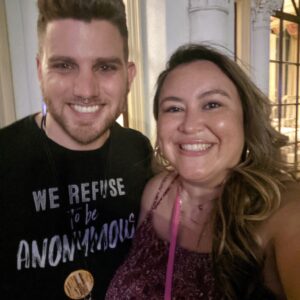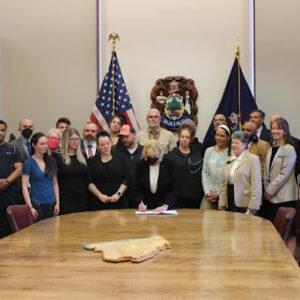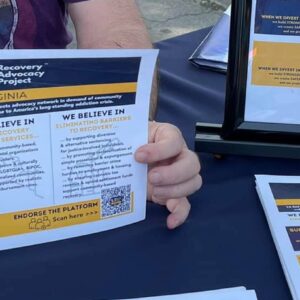Recovery advocates in Texas are working on something big. By the end of September 2022, Texas Recovery Advocacy Project (RAP) wants to register 1,000 recovery voters in the state. Even though they are small in numbers they are determined to get out the recovery vote.
“At the end of the day, Texas RAP is a small team and we would love to get bigger,” Daniel Hatcher said. “We are looking for more folks across the state of Texas to get involved, stay involved and really create that constituency of consequence.”
Daniel is a Project Coordinator with RecoveryATX and is a person in recovery from substance use challenges and survival sex work.
“What that means to me is that I resolved my problematic relationship with drugs and alcohol, and stopped commodifying my body for safety and security in May 2017.”
Though Daniel has presented at the 2021 Mobilize Recovery and was also a former outreach worker for Oxford House, he is relatively new to the field of recovery support and advocacy.
“A year ago I didn’t know anything about anything!” Daniel quipped. “Before RAP, I just voted and that was it.”
Daniel has been working on the Texas RAP team for two years, and their major priority right now is to get recovery voters to the polls. The first step in that process is to gather information on those in recovery who ARE and ARE NOT registered to vote. To gather that information, the team put together an Action Network survey to distribute to the state’s recovery homes (like Oxford Houses), and also the Recovery Community Organizations (RCOs) in the state. Once they have all the data needed, the team will plan a course of action to those who are registered, and those who are not.
“Our goal is to register 1000 recovery voters,” Daniel said while also commenting on staying right-sized. “We try to look at things that are digestible, and what is utilizable in our existing networking frameworks.”
In addition to the voter registration initiative, Texas RAP also wants to educate those on the recovery vote in general and also voting rights for those with felonies. In Texas, once you are out of prison, off parole or probation, your right to vote gets automatically restored.
“Once you’re off paper, you can vote!” Daniel said from his home office in Dallas. “AND it is automatically restored, you don’t even have to apply.”
So many folks do not understand the laws around voting, so they don’t realize they can vote in any election once they are done with probation and paying their fines, even if they still have felonies on their record.
To help educate folks, Texas RAP recently held a “Mythbusting” session, similar to a lunch and learn workshop, where they outlined the rights of individuals with felonies and provided information on why voting is important, especially when voting for recovery rights.
While Texas RAP is in the midst of a voter registration drive, they also want to increase the impact of their group and reach all areas of Texas.
“The majority of our state is rural and they really struggle with being able to create data that pulls in money to their area to fund any kind of continuum of care for substance use issues,” Daniel commented. “One agency in East Texas services 23 counties.”
To do more, the team is looking to expand and get advocates to represent all the parts of the state on Texas RAP.
“We are actively building a vision for what Texas RAP is and finding ways that we can expand our team and provide opportunities for people to organize that aren’t just in policy or legislation,” Daniel explained, while also talking about how excited he was to move back to Austin in the upcoming months.
Sometimes, folks would join the Texas RAP team and get intimidated or lose interest because they did not understand the Legislature, which is a governing body with an authority to make laws for a political entity. Texas is also colloquially referred to as a state with drops of blue in an ocean of red, referring to pockets of left-leaning Democrats mixed in with a majority of right-leaning Republicans.
“I think it’s important to talk about the political landscape of Texas. Intersectionality is a really important part of the conversation when we talk about politics,” he said. “There seems to be a disconnect between governmental control of people’s bodies and governmental oppression of certain minority groups, and these are absolutely precursors to higher prevalence of Substance Use Disorder (SUD).”
No matter what is going on in Texas, Daniel and the other members of Texas RAP are passionate and ready to mobilize for recovery.
“It’s exciting to be connected to a network of people across the country. At the end of the day, I am neither of them (political party) and sometimes I feel left by the wayside.” Daniel explained. “ So it’s cool to be in these spaces where party doesn’t matter.”
“What matters is the endgame – making change and bringing people to the table.”
If you want to contact Daniel, please email [email protected], and if you want to get involved with Texas RAP, please contact [email protected].





